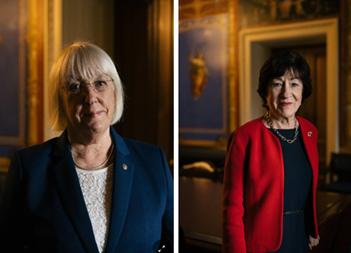Meet the Women Trying to Avoid a Spending Train Wreck in Congress
For the first time, the leaders of the House and Senate Appropriations Committees are all women, as is the top White House budget official. Can they avert a fiscal disaster? They’re determined to try.

New York Times | By: Emily Cochrane

The women leading budget negotiations have been friends for years and share a deep respect for and expertise in the appropriations process.
Inside a grand committee room in the Capitol on a recent afternoon, Senator Patty Murray paused at the end of the 31-foot conference table to re-enact how, as a rank-and-file lawmaker years ago, she would have to stand up and wave to catch the attention of the men running negotiations from the center of the room.
Now it is Ms. Murray, Democrat of Washington, whose name is etched in gold cursive at the center of the table, set among frescoes of Roman goddesses and a multitiered crystal chandelier, signifying her position as the chairwoman of the powerful Senate Appropriations Committee. These days, she is part of the first-ever all-female team of Republicans and Democrats to lead the congressional committees that control government spending.
The group will play a pivotal role this year in what is expected to be an epic and high-stakes fiscal battle whose two principal players, President Biden and Speaker Kevin McCarthy, the California Republican, will meet for the first time on Wednesday to feel each other out for the coming fight.
Etched alongside Ms. Murray’s name is that of Senator Susan Collins of Maine, the top Republican on the panel. In the House, Representative Kay Granger, Republican of Texas, is the newly installed chairwoman of the Appropriations Committee, and Representative Rosa DeLauro of Connecticut is the top Democrat. At the White House, the top budget official is Shalanda Young, the first Black woman to head the Office of Management and Budget.
Their political profiles are vastly different — Ms. Murray and Ms. DeLauro are both liberals, Ms. Collins is a center-leaning Republican and Ms. Granger is a staunch conservative. But they have all experienced versions of the same struggle on Capitol Hill: the hustle to get recognized, the extra layer of scrutiny from male colleagues and often being the only woman in the room.
And as Republicans and Democrats position themselves for a major clash over funding in the coming months, they say they are determined to defy what they acknowledge are steep odds and bring some sanity and orderliness to the spending debate.

Senator Patty Murray, Democrat of Washington, is the chairwoman of the Senate Appropriations Committee. Senator Susan Collins of Maine is the top Republican on the committee.
“We do bring different experiences, and in my experience, are often more collaborative than our male counterparts,” Ms. Collins said. The hope, she added, was “that we will work together as a team, knowing that it is going to be difficult. But I think that new leadership and sometimes, ironically, a divided Congress politically can plant the seeds for good compromise.”
In congratulatory and birthday phone calls and quiet asides at meetings where they have gathered to document their collective accomplishment, the women have discussed their desire to return to the days when the powerful spending panels publicly worked for months to hammer out and pass a dozen individual funding bills. It would be a major departure from the current practice, which typically involves months of stalemate followed by a few weeks of frenzied scrambling to put together a huge bill totaling hundreds of billions of dollars that must be rammed through Congress with the threat of a shutdown looming.
“I’ve gotten to see the arc of these jobs up close and personal,” said Ms. Young, a former staff director for the House Appropriations Committee. “If the group was different, maybe I’d be less optimistic, but with this group, I do know that they care more about what’s best for the American people.”
…
The four lawmakers have all been in Congress since the 1990s, when there were far fewer women serving, and have steadily worked together as they have climbed the ranks of the committees. Ms. DeLauro, the daughter of Italian immigrants, and Ms. Murray, whose family once relied on food stamps, have teamed up to establish lifelines for the nation’s poorest families.
Ms. Granger, who was the first female mayor of Fort Worth before serving in Congress, has championed her district. Ms. Collins, whose family has maintained a lumber business for generations, has emerged as one of the Senate’s most meticulous bipartisan negotiators in moments of gridlock over both funding and policy.
“I believe that there’s a fundamental understanding of why we are here, and why we serve here,” Ms. DeLauro said, her half-dozen rings clinking together as she gestured over a desk piled high with paper and briefing material she pores over every day. “It’s a tremendous power the institution has. Its potential is just extraordinary. It doesn’t always do what you want, but it has the ability to transform people’s lives.”
###